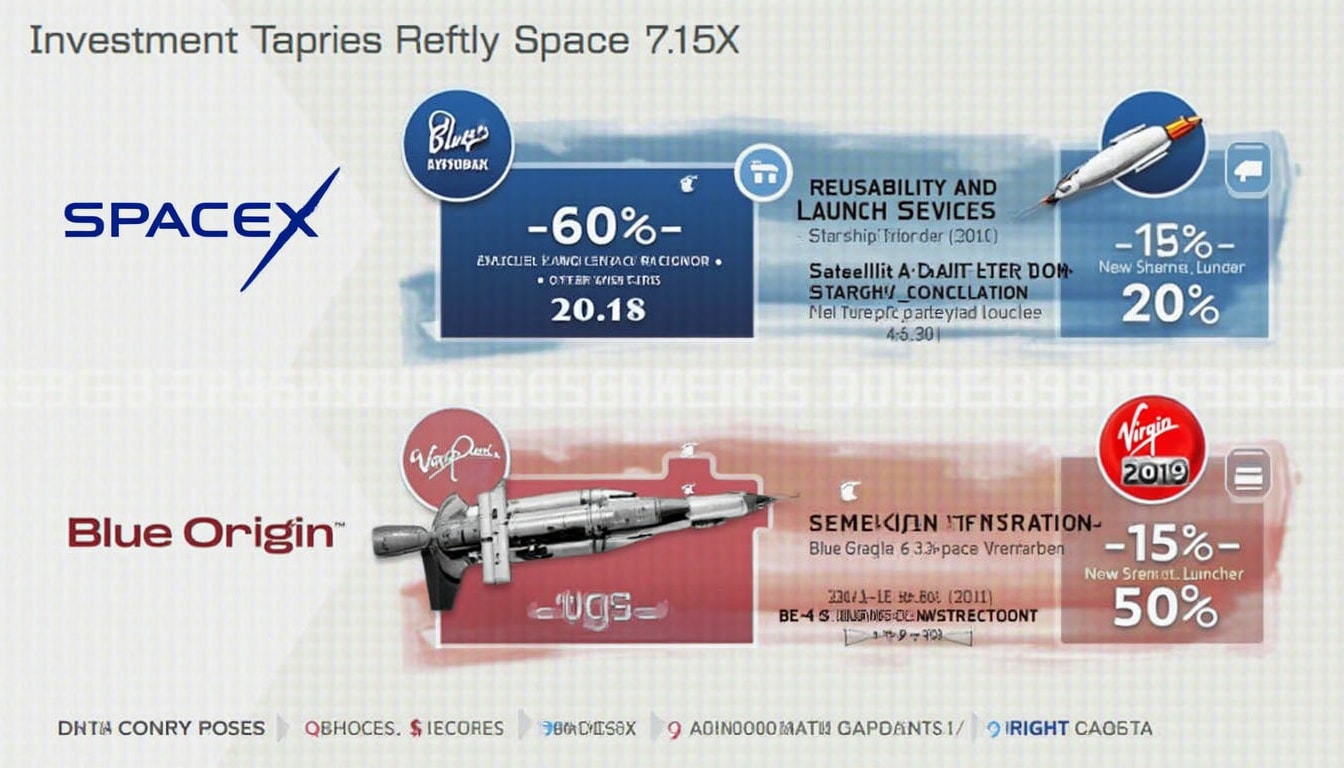The world of space exploration is increasingly being scrutinized, especially as the boundaries between national security and commercial interests become ever more blurred. At the center of this storm is SpaceX, Elon Musk’s groundbreaking aerospace company, which has attracted attention not only for its revolutionary technologies but also for its questionable investment practices. Recent revelations indicate that SpaceX allows Chinese investors to acquire stakes in the company through complex offshore arrangements. This intricate web of finance raises serious questions about transparency and national security, pushing to the forefront critical discussions about foreign investments in sensitive sectors. As we delve into this phenomenon, we uncover how SpaceX, amidst its ambitious projects, may be treading a precarious path towards complicity with foreign interests that raise alarms in strategic sectors, and how this might shape the future landscape of not just SpaceX, but the entire space industry.
The Secret Investment Mechanism: A Closer Look at SpaceX’s Practices
In an unsettling turn of events, SpaceX has come under fire for its clandestine approach to foreign investments, particularly those originating from China. Documents from a recent court case have confirmed that SpaceX permits Chinese entities to buy shares as long as they go through offshore channels, such as the Cayman Islands or other secretive jurisdictions. This practice showcases not only the company’s need for capital but also a troubling tendency to sideline adequate scrutiny regarding foreign ownership.

Understanding the Mechanism
SpaceX’s Chief Financial Officer (CFO) elaborated on this necessity by emphasizing the importance of maintaining a facade of anonymity regarding Chinese ownership. Iqbaljit Kahlon, a notable investor involved, testified that to keep as many facets of ownership undisclosed, investors from China typically establish intermediaries. This manipulation of corporate structures through jurisdictions like the British Virgin Islands allows SpaceX a layer of separation from potential risks associated with foreign investments.
Experts have flagged this method as unusual, prompting worries that a defense contractor like SpaceX endeavors to conceal foreign influence, thus encroaching upon national security parameters. The federal government holds considerable oversight powers, including the ability to investigate and potentially block foreign investments that present risks to security. However, nuances exist; if an investment is deemed passive, transparency requirements can be circumvented.
Furthermore, regulatory ambiguity does not just affect SpaceX. Other major players in the field, such as Boeing, Lockheed Martin, and Northrop Grumman, can also be impacted if they were to adopt practices that conceal foreign interests. Thus, one child company’s approach has ripple effects throughout the industry and in discussions relating to joint ventures and collaborations that are often tethered by national security concerns.
Implications for National Security
The implications of SpaceX‘s approach extend well beyond its balance sheet. As Chinese investments, structured through murky offshore entities, arise, concerns materialize about the technology getting into the wrong hands. The U.S. government has historically viewed even minor shares from Chinese investors with suspicion, which ties back to the larger concerns regarding economic espionage and potential military applications of technology.
Kahlon’s testimony also hints at a more profound relationship between SpaceX and its investors than disclosed. His influence and historical ties to the company underscore a deep-seated dependence on outer financial interests, raising the specter of financial fear obscuring due diligence. With such significant sums flowing into capabilities concerning critical technologies, the question persists: are companies like SpaceX doing enough to protect national interests?
This atmosphere of anxiety amplifies as discussions extend to how SpaceX‘s practices may serve as templates for other industry stakeholders. Amid the evolving nexus of space venture capital, such arrangements can lead to non-compliance with export administration regulations and further complicate the narrative surrounding the progress of entities like Virgin Galactic and Blue Origin, who are also competing to secure government contracts.
The Competitive Landscape: SpaceX and Its Rivals
As SpaceX boldly navigates the waters of international investment, it finds itself in a highly competitive arena populated by industry giants striving for dominance in the evolving space sector. Competition is fierce among various entities, including Rocket Lab, Planet Labs, Aerojet Rocketdyne, and the previously mentioned companies, each attempting to carve a niche and secure lucrative contracts from government agencies.
The Emergence of New Players
The entrance of new players into this landscape adds layers of complexity to an already intricate sector. With growing interest from venture capitalists in space technology, the hurdles are not confined to established firms. Furthermore, foreign investments raise the stakes, especially when it comes to compliance with national security constraints. Not only must these new entities navigate competitive pressures from seasoned players like NASA, but they must also remain vigilant and cohesive with evolving legal standards around foreign ownership.
While SpaceX currently stands out due to its vast achievements—having successfully launched major missions, developed the Falcon 9, and initiated human spaceflight through the Crew Dragon program—its approach towards foreign investments could set dangerous precedents. As documented in multiple reports, foreign entities leveraging similar advantages may replicate SpaceX‘s practices to engage with U.S. markets. For example, the growing interest among Chinese companies to collaborate with established names like Aerojet Rocketdyne has raised alarms about potential technology leaks.
Strategic Implications for Industry Evolution
Ultimately, the ongoing challenges facing SpaceX and its primary rivals highlight a shift in the very framework governing the space sector. The intersection of innovation, security, and investment becomes increasingly pivotal for business stability. As the balance of power continues to evolve, it is crucial that SpaceX and its competitors work towards maintaining regulatory compliance while embarking on ambitious projects.
The convergence of U.S. competitiveness and foreign investment leads to questions about industry resilience in the face of strategic geopolitical shifts. Such dynamics hence usher in a fresh perspective on how companies handle stakeholder relationships and adopt operational frameworks void of potential minefields that could tarnish reputations and affect bid competitiveness.

The Ethical Debate: Transparency versus Secrecy
The ethical ramifications of SpaceX‘s practices are profound and multifaceted. Investors, customers, and even governments worldwide are now keeping a scrutinizing eye on the aerospace firm over its questionable methods of allowing foreign ownership through indirect channels. Faced with dilemmas over transparency and strategic secrecy, a wider discussion emerges surrounding ethical investment practices in technology-rich industries.
Public Perception and Investor Trust
Maintaining investor trust hinges on transparency. As details regarding SpaceX‘s dealings surface, the company risks losing public confidence if these practices are perceived as unethical or evading oversight. Companies operate in environments where public opinion can dictate investment flows, alterations in revenue, and even market valuations. A tarnished reputation can stunt progress and impede partnerships, which is all the more poignant since SpaceX relies heavily on private funding and government contracts, underscoring the need for trust among stakeholders.
With the criticism mounting concerning foreign investments, the broader array of stakeholders, ranging from private investors to government entities, gain added incentive to challenge SpaceX regarding its policies. This has far-reaching implications across the industry, pushing competitors like Lockheed Martin and Boeing to adapt their strategies and align with new community standards regarding investments.
The Future of Investment Ethics in Aerospace
The landscape of aerospace investment ethics necessitates a discussion that is not easily solvable by clear-cut revelations or black-and-white distinctions. The ongoing debate showcases the necessity for industry leaders to navigate investments in a climate of accountability. This climate is particularly important for SpaceX, where market positioning largely depends on public trust and regulatory compliance.
If practices elucidating secrecy over straightforwardness characterize the landscape, emerging companies could inadvertently slide into similar patterns, diluting ethical standards across the sector. Fostered by the United States’ evolving views on foreign investments, a recalibration of investor expectations begins to shape future investment strategies.
Future Outlook: Navigating the New Frontier
As SpaceX tallies its successes and navigates the complicated territory of Chinese investments, the stakes remain high. Continued scrutiny from various stakeholders combined with a rapidly changing geopolitical climate imposes substantial pressure on companies to adapt and innovate, demanding clarity in how they manage foreign investments amidst prevalent risks.
Moving forward, SpaceX must cultivate an environment fostering transparency while balancing strategy and ambition. By doing so, it can preserve its leading edge while cultivating trust among its investor base. Furthermore, the drive toward maintaining compliance with U.S. national interests is essential, positioning SpaceX favorably amid heavy competition from industry peers.
In the longer term, the landscape of space exploration may very well redefine the parameters of collaboration. With emerging technologies shaping how companies operate, there is potential for major shifts as businesses reassess how to harmonize aspirations with responsibilities epitomized by ethical investment practices. The ability to navigate this new frontier hinges on a company’s ability to adapt, evolve, and remain accountable amidst intrinsic challenges.





Leave a Reply